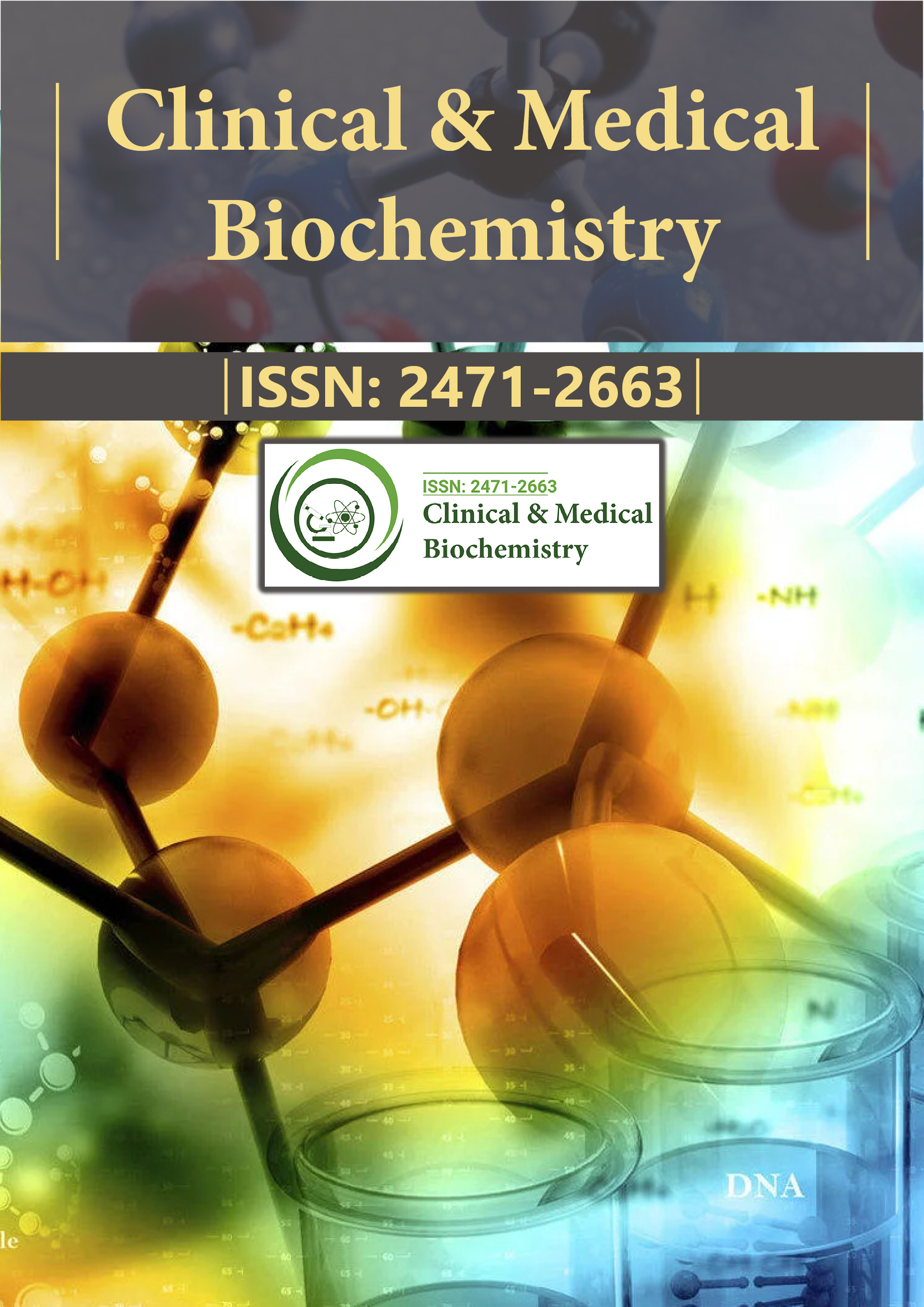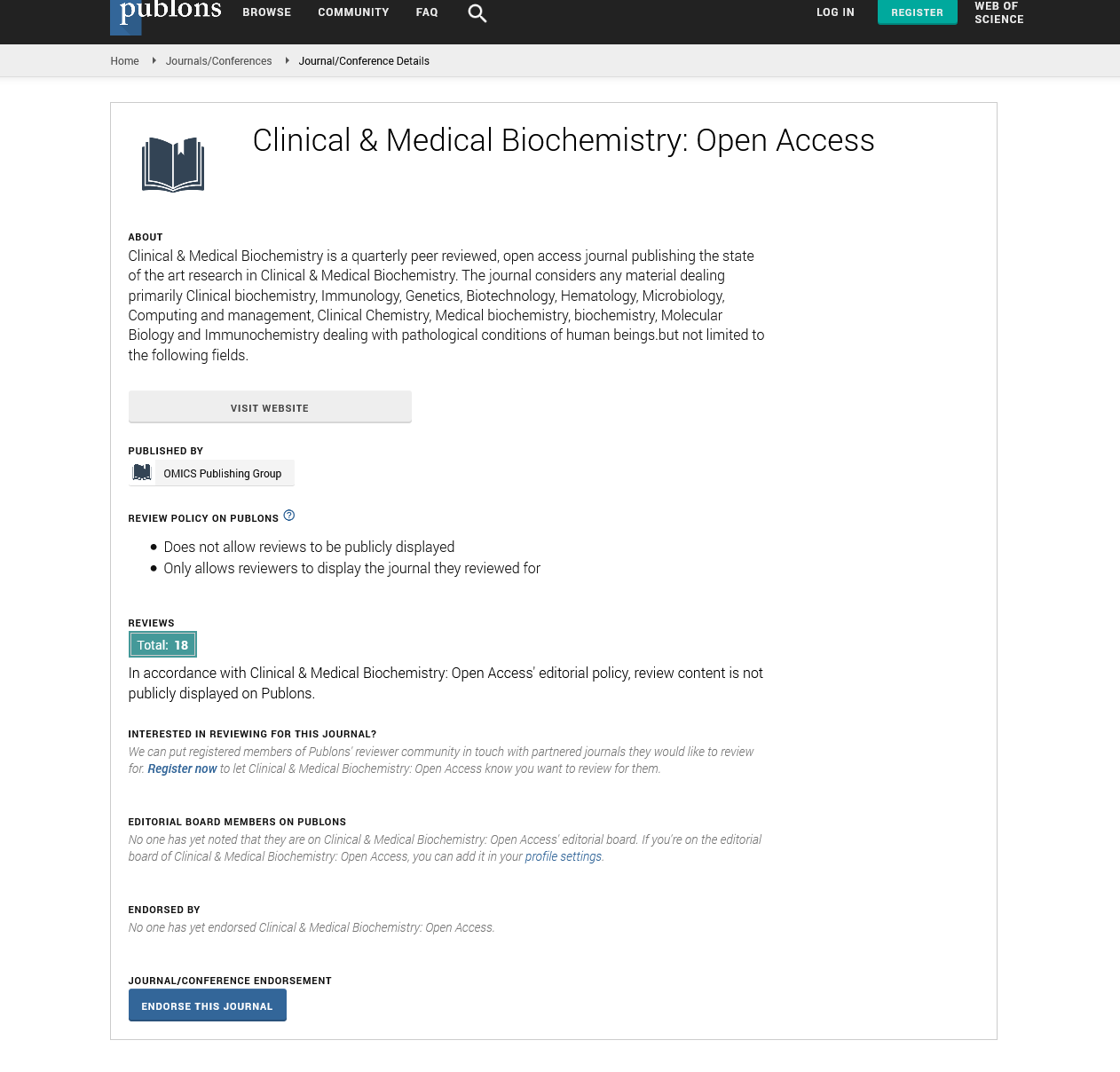Indexed In
- RefSeek
- Directory of Research Journal Indexing (DRJI)
- Hamdard University
- EBSCO A-Z
- OCLC- WorldCat
- Scholarsteer
- Publons
- Euro Pub
- Google Scholar
Useful Links
Share This Page
Journal Flyer

Open Access Journals
- Agri and Aquaculture
- Biochemistry
- Bioinformatics & Systems Biology
- Business & Management
- Chemistry
- Clinical Sciences
- Engineering
- Food & Nutrition
- General Science
- Genetics & Molecular Biology
- Immunology & Microbiology
- Medical Sciences
- Neuroscience & Psychology
- Nursing & Health Care
- Pharmaceutical Sciences
Perspective - (2023) Volume 9, Issue 6
Personalized Medicine in the Environment of Modern Healthcare
Chen Zhang*Received: 23-Oct-2023, Manuscript No. CMBO-23-24116; Editor assigned: 26-Oct-2023, Pre QC No. CMBO-23-24116 (PQ); Reviewed: 14-Nov-2023, QC No. CMBO-23-24116; Revised: 21-Nov-2023, Manuscript No. CMBO-23-24116 (R); Published: 28-Nov-2023, DOI: 10.35841/2471-2663.23.9.200
Description
In the landscape of modern medicine, a revolutionary shift is underway with the advent of personalized medicine. Traditionally, medical treatments have been designed with a one- size-fits-all approach, but personalized medicine, also known as precision medicine, takes a more individualized route. It recognizes that each patient is unique, from their genetic makeup to their lifestyle, and aims to alter medical interventions to match these individual characteristics. This paradigm shift holds the capacity of more effective treatments, reduced side effects, and improved overall patient outcomes.
The foundation: Genomics and beyond
At the heart of personalized medicine lies genomics—the study of an individual's entire set of genes, known as the genome. The Human Genome Project, completed in 2003, was a monumental milestone that paved the way for accepting the intricate code embedded in our DNA. Since then, technological advancements in DNA sequencing have made it feasible to decipher an individual's genetic blueprint with unprecedented speed and accuracy. Genetic information is a key pillar of personalized medicine. By analyzing an individual's genetic makeup, clinicians can identify genetic variations that may influence how a person responds to certain medications or their susceptibility to particular diseases. This knowledge forms the basis for tailoring treatment plans that are not only more effective but also safer for the patient.
Applications of personalized medicine
Cancer treatment: Personalized medicine has had a profound impact on cancer treatment. Traditionally, cancer therapies were often characterized by their broad toxicity, affecting both healthy and cancerous cells. With personalized medicine, the focus shifts to identifying specific genetic mutations driving a patient's cancer. Targeted therapies can then be employed to disrupt the molecular pathways responsible for the cancer's growth, leading to more precise and effective treatment strategies.
Pharmacogenomics: Pharmacogenomics, a subset of personalized medicine, explores how an individual's genetic makeup influences their response to drugs. Genetic variations in drug metabolism enzymes can impact how quickly or slowly a drug is processed in the body. This information allows clinicians to customize medication regimens, choosing drugs and doses that are more likely to be effective and well-tolerated by the patient.
Infectious diseases: The field of personalized medicine extends its reach to infectious diseases. Genetic factors can influence an individual's susceptibility to certain infections and their response to antiviral or antibacterial medications. Changes in treatment based on the individual's genetic profile enhances the likelihood of successful outcomes.
Neurological disorders: Personalized medicine is making strides in the management of neurological disorders such as Alzheimer's and Parkinson's diseases. Genetic markers associated with these conditions can guide treatment approaches, allowing for earlier and more targeted interventions.
Challenges and considerations
While the potential benefits of personalized medicine are substantial, its integration into mainstream healthcare is not without challenges. One significant hurdle is the cost associated with genetic testing and personalized treatments. As technology advances and becomes more accessible, however, the cost is expected to decrease, making personalized medicine more widely available. Ethical considerations also come into play, particularly regarding the privacy and confidentiality of genetic information. Striking a balance between utilizing genetic data for personalized treatments and safeguarding patients' privacy is an ongoing challenge that requires careful navigation. Education and training of healthcare professionals in the realm of personalized medicine are essential. Integrating genetic information into clinical decision-making requires a solid consideration of genomics, and on-going education is important as the field continues to evolve.
The future of personalized medicine
The future of personalized medicine is characterized by a convergence of technologies, including advances in genomics, bioinformatics, and data analytics. Artificial intelligence and machine learning are poised to play a significant role in deciphering complex genetic data and identifying patterns that inform personalized treatment plans. As our consideration of the intricate interplay between genes, environment, and lifestyle factors deepens, personalized medicine is likely to expand beyond genetics. Integration of data from wearable devices, monitoring of biomarkers, and comprehensive health records will contribute to a more holistic approach to individualized healthcare. Collaboration between researchers, healthcare providers, and pharmaceutical companies is key to advancing the field. Clinical trials designed with a personalized medicine framework can accelerate the development of targeted therapies, bringing innovative and tailored treatments to patients more efficiently.
Conclusion
Personalized medicine represents a paradigm shift in healthcare, ushering in an era where treatments are tailored to the unique characteristics of each individual. The convergence of genomics, technology, and a deeper kind of disease mechanisms holds the ability of more effective and safer medical interventions. While challenges exist, on-going advancements in technology, ethical considerations, and education are paving the way for the widespread integration of personalized medicine into mainstream healthcare. As we continue to solve the problems of the human genome, the future of medicine looks increasingly personalized, sharing joy for improved outcomes and a new era of patient-centered care.
Citation: Zhang C (2023) Beyond Self-Defense: The Molecular Basis and Diversity of Autoimmune Disorders. Clin Med Bio Chem. 9:200.
Copyright: © 2023 Zhang C. This is an open-access article distributed under the terms of the Creative Commons Attribution License, which permits unrestricted use, distribution, and reproduction in any medium, provided the original author and source are credited.

